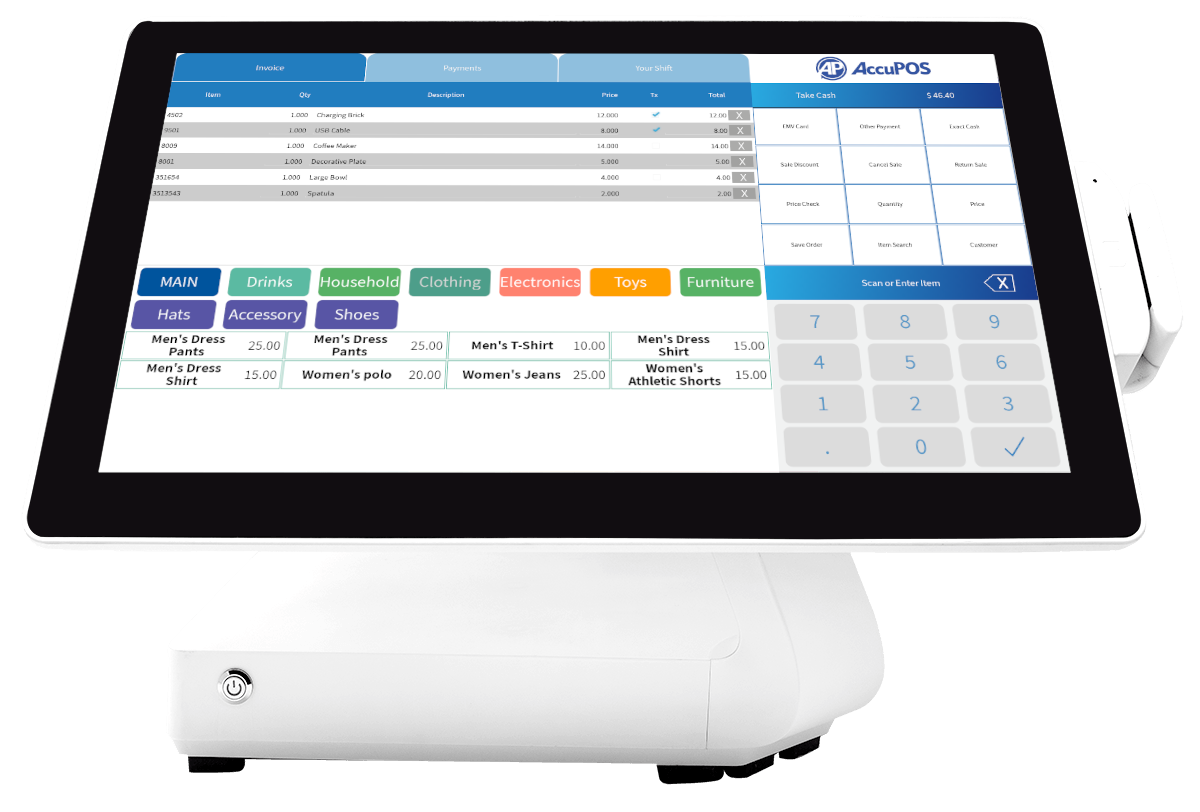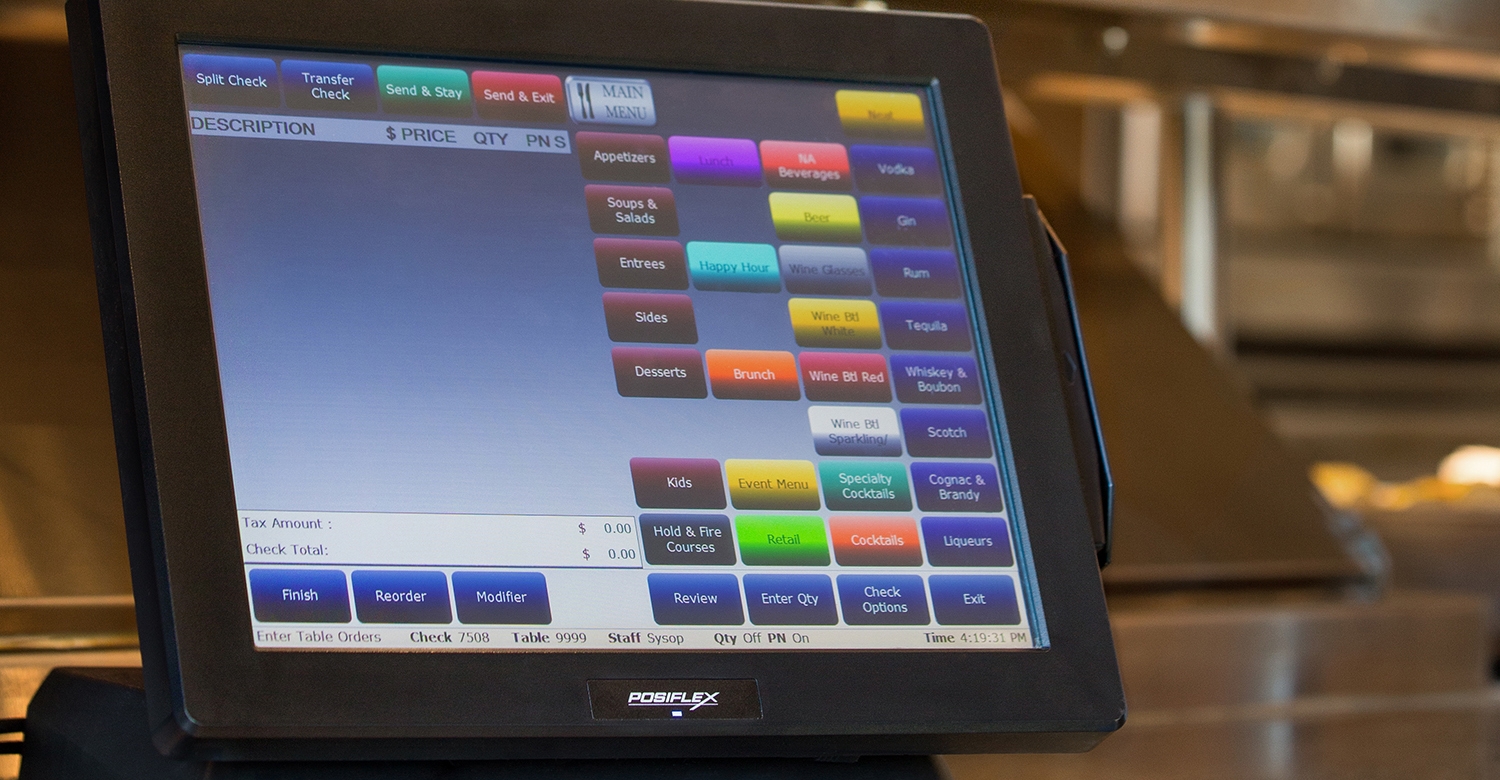The 9-Minute Rule for Pos System For Small Business
The 9-Minute Rule for Pos System For Small Business
Blog Article
Not known Details About Pos Software

POS: Retail Point-Of-Sale Solutions Streamline Deals
The Definitive Guide to Point Of Sale

Hardware Elements of a Point of Sale System What makes a POS system tick? It's not just software application; the hardware plays a starring function. Think of it as the body to the software application's brain. Without the ideal get more info hardware, even the most advanced POS software application is just a quite face. Necessary POS Hardware So, what are the must-haves? Let's break it down. The main processing unit, typically a computer system or tablet, is the heart of the operation. The monitor or touchscreen show enables personnel to interact with the system. A barcode scanner accelerate the checkout process. Remember the days of by hand entering each code? The reliable invoice printer offers clients with a record of their purchase. A cash drawer keeps your money safe and organized. A card reader allows customers to pay with credit or debit cards. Diving Deeper: Beyond the Fundamentals However wait, there's more! Depending on your company, you may require specific hardware. A dining establishment may integrate cooking area printers to relay orders, while a retail store might utilize label printers for item tagging. Ever question how your regional bakery quickly prints those delicious-looking labels? Picking the Right Hardware: A Balancing Act Picking the right hardware isn't just about purchasing the most expensive devices. It's about discovering the sweet spot in between functionality, resilience, and budget plan. A little service simply beginning out might select a more basic setup, while a high-volume retailer will need robust, high-performance devices. Is it much better to purchase new or used? Consider your options thoroughly. A new system provides the latest technology and service warranty protection, however a refurbished system can save you cash. The Future of POS Hardware What does the future hold? Expect to see much more integration with mobile gadgets, biometric scanners for employee authentication, and advanced analytics dashboards showed on bigger, clearer screens. Imagine a world where stock is instantly updated in real-time as items are scanned-- a world where you can track your very popular product from anywhere in the world. The possibilities are endless, and the hardware is constantly evolving to satisfy the demands of today's businesses. Are you all set to upgrade your point of sale system?
Software Application Features and Capabilities: The Heart of Your POS System
Ever watch a skilled barista slide through a hectic early morning rush? Their trick isn't simply caffeine; it's a smooth dance with their POS system. The software application is the conductor of your service symphony, managing whatever from sales to stock. What notes should you be listening for? What abilities genuinely matter in today's market?
Inventory Management: Beyond Counting Beans
Forget spreadsheets that haunt your dreams. Modern POS systems offer real-time stock tracking, alerting you when your stock of artisanal coffee beans dips precariously low. Consider it as a digital guardian angel, preventing those uncomfortable "Sorry, we're out!" moments to clients. What if you could likewise predict need based upon historic data? Many systems now offer forecasting tools, a powerful weapon against overstocking and lost sales. This assists avoid the predicament of lacking popular items or collecting excess inventory of slow-moving products, both of which can constrain capital and space.
Sales Reporting and Analytics: Translating the Information
Sales information is the new gold, and your POS system is the miner. Forget just knowing how much you sold today. Dive deep into the data to discover patterns, determine your very popular products, and understand consumer habits. Which menu product pairs completely with the everyday special? Which promo resonated most with your clientele? These insights are not simply fascinating; they're actionable intelligence. Without dependable sales reporting, browsing the intricacies of business decision-making becomes like cruising without a compass, increasing the possibility of bad moves and missed chances.
Customer Relationship Management (CRM): Structure Bridges, Not Walls
Remembering a routine customer's name and favorite order is captivating, but scaling that personal touch is tricky. POS systems with CRM abilities permit you to track consumer purchase history, preferences, and even birthdays. Envision instantly providing a discount rate on their birthday-- a small gesture that fosters loyalty and encourages repeat organization. However there is the possible snag of poor data quality, which can cause unreliable client profiles and ineffective marketing efforts.
Payment Processing: Enhancing the Transaction
The checkout experience can make or break a sale. Seamless combination with various payment techniques-- charge card, mobile wallets, even copyright-- is non-negotiable. Can your system manage split payments? Does it provide safe and secure tokenization to protect consumer data? A cumbersome payment process is like hitting a sour note in your business symphony, potentially disrupting the entire efficiency. Guaranteeing compatibility with developing payment innovations and adherence to security standards are critical for maintaining client trust and operational efficiency.
Employee Management: Keeping the Team in Sync
From clocking in and out to handling permissions and tracking performance, worker management features streamline operations and improve accountability. Is scheduling a nightmare? Lots of POS systems offer integrated scheduling tools, enhancing staffing levels based on predicted need. A typical challenge that is frequently overlooked is the challenge of integrating employee management functionalities with payroll systems, which can lead to errors and ineffectiveness in wage calculations.
Advanced Features: Leveling Up Your Operations
- Table Management: Ideal for dining establishments, this feature permits you to envision your dining-room, track table status, and handle appointments.
- Commitment Programs: Reward your best clients and encourage repeat business with integrated loyalty programs.
- Online Ordering Combination: Effortlessly incorporate your POS system with online ordering platforms to expand your reach.
Picking the best POS system has to do with more than simply functionality; it has to do with finding a partner that can grow with your organization. Consider your present needs, prepare for future development, and do not hesitate to ask the hard questions. The right software can transform your organization from a chaotic cacophony into a harmonious masterpiece.
Industry-Specific POS System Applications
Believe of the regional bakeshop, busy with morning clients yearning fresh croissants. A generic POS system might manage transactions, however can it manage complex dishes, track ingredient stock, or automatically change production schedules based upon sales data? Most likely not. That is where the charm of industry-specific POS systems shines.
Restaurants and Hospitality
For bustling dining establishments, speed and accuracy are paramount. How many times have you seen servers managing orders, modifications, and splitting expenses, all while attempting to provide excellent service? A dining establishment POS system streamlines these procedures, permitting for table management, cooking area order tickets, and even online purchasing combination. These systems typically consist of features like ingredient-level inventory tracking, crucial for handling food expenses and decreasing waste. Ever question why your preferred meal is sometimes not available? It might stem from an absence of proper stock management.
- Table Management
- Kitchen Area Order Tickets
- Online Purchasing Integration
- Ingredient-Level Inventory Tracking
Retail Solutions
Retail, with its varied stock and customer interactions, demands a various set of tools. Envision a boutique clothing store struggling to keep an eye on sizes, colors, and seasonal collections using a basic checkout system. An industry-specific retail POS system provides functions like barcode scanning, consumer loyalty programs, and in-depth sales reporting. These systems can even integrate with e-commerce platforms, offering a smooth omnichannel experience for clients. Did you know some retail POS systems can anticipate future sales patterns based upon historic information? Now that is effective!
The Dangers of a Mismatch
Picking the incorrect POS system can develop substantial functional obstacles. A clothing boutique utilizing a restaurant POS, for example, would find it inappropriate for handling inventory with sizes and colors. The lack of correct reporting and analytics could cause misinformed acquiring choices and lost income. The outcome could be similar to attempting to fit a square peg in a round hole.
Key Factors to consider
Selecting an industry-specific POS system needs cautious assessment. Think of your service's distinct requirements and operational workflows. Does the system incorporate with existing software application? Does it use the necessary reporting capabilities? Is it scalable to accommodate future development? A well-chosen POS system is not just a deal tool; it's a tactical possession that can drive performance, improve customer complete satisfaction, and eventually, improve your bottom line. Keep in mind, it is a financial investment in your organization's future, not simply a cost.
Security Factors To Consider for Point of Sale Systems
Ever heard the tale of the mom-and-pop shop that lost everything since of a single, ignored security defect in their POS system!.?. !? It's a cautionary tale, and it highlights a vital element often overshadowed by the attraction of elegant functions and structured operations. The truth is, a POS system is only as great as its security. What excellent is a system that crunches numbers in a flash if it allows wrongdoers to swipe consumer's information simply as quickly?
The Vulnerability Minefield
The digital landscape is a battlefield. Every POS system, despite size or elegance, is a potential target. Are you really got ready for the risks prowling around the corner? The real pinch comes when you find that your out-of-date software application has a gaping hole that hackers can exploit, turning your business into an unwitting accomplice in identity theft. The trouble is that hackers are crafty and are constantly altering their techniques.
Common Security Spaces and Expert Tips
- Weak Passwords: "Password123" isn't cutting it. Use strong, unique passwords for all POS system accounts and change them regularly. Two-factor authentication is a must.
- Unsecured Networks: Your Wi-Fi resembles leaving the front door open. Secure your network with strong file encryption (WPA3 if possible) and think about a separate network for your POS system.
- Out-of-date Software Application: Software vendors patch security holes all the time. Failing to update resembles inviting difficulty. Set up automatic updates or schedule regular upkeep.
- Staff member Training: Your personnel is your first line of defense. Train them to recognize phishing efforts, protect passwords, and report suspicious activity.
Information File Encryption: Your Shield Versus the Dark Arts
Think about data encryption as a secret code. It scrambles sensitive details, like charge card numbers, making it unreadable to unapproved users. Without encryption, your consumers' monetary information are like sitting ducks, ripe for the picking by cybercriminals. It's not almost protecting your consumers; it has to do with protecting your track record and avoiding large fines.
PCI Compliance: The Rulebook You Can't Ignore
If you accept credit cards, you're bound by the Payment Card Market Data Security Standard (PCI DSS) It's a set of security requirements created to safeguard cardholder information. Failing to comply can lead to fines, charges, and even the loss of your capability to process charge card payments. It's a headache, yes, but it's a necessary one. Consider PCI compliance as the expense of doing business in the digital age.
Consider this: every deal processed through your point of sale is a possible entry point for destructive actors. By executing robust security procedures, you're not simply protecting your business; you're safeguarding your consumers' trust and guaranteeing the long-lasting viability of your operations. The security of your POS system isn't simply a technical issue; it's a service imperative. It requires consistent vigilance, proactive measures, and a commitment to staying ahead of the curve.